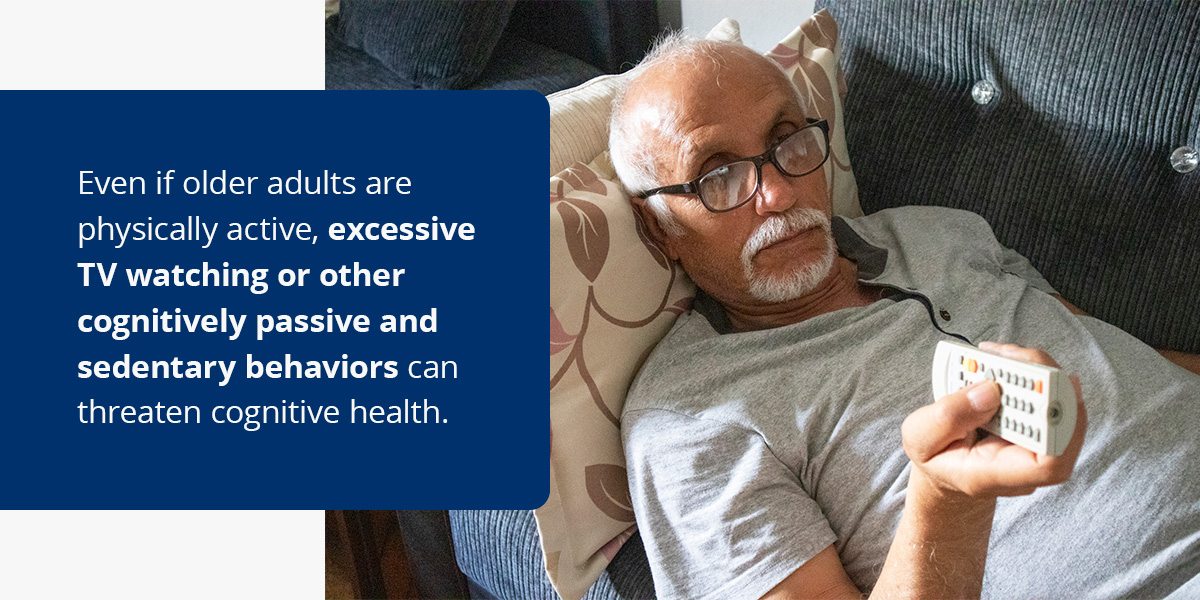As we age, our leisure activities and preferences evolve, and one pastime that has become a ubiquitous part of modern life is television. For older adults, television can serve as a virtual window to the world, offering entertainment, information and a sense of companionship. However, with concerns about sedentary lifestyles and potential negative content influences, the question arises — is watching TV truly beneficial for older adults?
By fostering a deeper understanding of the complexities surrounding TV watching for older adults, we hope to equip families, caregivers and older adults with the knowledge to make informed choices promoting a balanced and fulfilling lifestyle.
What Are the Effects of Watching TV for the Elderly?
Looking at the effects of watching TV for the elderly, one of the benefits is the entertainment and companionship it provides. As people age, physical limitations or health conditions may restrict their ability to participate in certain activities.
Television becomes an accessible and comforting source of entertainment, allowing them to unwind, laugh and find solace in the fictional worlds depicted on screen. However, it is essential to acknowledge that excessive TV watching can have potential pitfalls for older adults. Encouraging regular breaks and incorporating light physical activities into their daily routine can counterbalance the sedentary aspects of watching TV.
The Positives of Watching TV
Television can play a significant and positive role in the lives of older individuals, offering a range of benefits that contribute to their well-being and overall quality of life. Here are some of the key positives of watching TV:
- Entertainment and companionship: As individuals age, they may face physical limitations or health conditions restricting their ability to engage in various activities. TV shows and characters can become familiar friends, providing companionship, especially for individuals who live alone or have limited social interactions. The sense of connection can alleviate loneliness and promote emotional well-being.
- Cognitive stimulation: Educational programs, documentaries and quiz shows provide opportunities for learning and expanding knowledge. Individuals can keep their minds active by engaging with different subjects and exploring new ideas through television.
- Access to information: Television is a valuable information source for older adults. News broadcasts keep them informed about current events and developments locally and globally. Weather updates are significant for older adults, helping them plan and prepare for various weather conditions.
- Cultural and social connection: Television programming often includes content that reflects previous generations’ cultural experiences and history. For older adults, watching shows that resonate with their own experiences can evoke a sense of nostalgia and fond memories.
- Relaxation and stress relief: Watching TV can also offer relaxation and stress relief. After a long day, sitting down to watch a favorite show or movie can be a calming and enjoyable experience.
The Cons of Watching TV
While television can provide numerous benefits, it is essential to be aware of the potential negative effects of excessive TV watching on health and well-being. For example, sitting for extended periods can contribute to a lack of physical activity, leading to various health issues such as:
- Reduced muscle strength.
- Joint problems.
- Greater risk of heart disease.
- Increased risk of obesity.
Sedentary behaviors like watching TV and using computers have become increasingly prevalent among adults aged 60 and older. While these activities offer entertainment and convenience, there are also potential risks associated with prolonged sedentary behavior, especially concerning dementia in older adults.
Dementia and TV
These researchers explored the impact of sedentary behaviors on dementia risk, independent of physical activity levels. Their study revealed that older adults who spend extended periods watching TV or engaging in other cognitively passive sedentary activities face an increased risk of developing dementia. Conversely, those who participated in more cognitively active sedentary behaviors, such as using a computer for tasks like reading, showed a reduced risk of dementia.
This study highlights the significance of distinguishing between various sedentary behaviors when assessing their impact on cognitive health outcomes. Engaging in sedentary behaviors that require mental stimulation, such as reading, appears to have a protective effect against dementia, because these activities keep the mind engaged and active.
Another study finds that the risk of dementia associated with sedentary behaviors remains significant regardless of the level of physical activity. Even if older adults are physically active, excessive TV watching or other cognitively passive and sedentary behaviors can threaten cognitive health.
Encouraging older adults to incorporate more cognitively active sedentary activities, such as using computers for reading or problem-solving, may help protect their cognitive function as they age.
Other Cons of TV
Here are a few other factors to consider:
- Negative content influence: Television programming is diverse and may include content unsuitable for all audiences, including older adults. They may be more susceptible to negative or distressing content, such as violence or graphic imagery, which can evoke anxiety, fear or sadness.
- Social isolation and withdrawal: While TV can provide a sense of virtual companionship, excessive TV watching can unintentionally lead to social isolation and withdrawal. Spending long hours in front of the screen may discourage older adults from engaging in face-to-face social interactions, reducing opportunities for meaningful connections.
- Disruption of sleep patterns: Blue light from screens can disrupt melatonin production. This hormone regulates sleep and can cause irregular sleep patterns. Over time, this may lead to sleep deprivation, which negatively impacts cognitive function, mood and overall health. Establishing a bedtime routine that reduces screen time before sleep can promote better sleep hygiene.
How Much TV Should the Elderly Watch?
While television can provide entertainment and cognitive stimulation, excessive TV watching can lead to a sedentary lifestyle and potentially negative health consequences. Here are some guidelines to help older adults strike a healthy balance in their TV viewing habits:
- Follow recommended time limits: The American Heart Association and American Academy of Pediatrics recommend limiting screen time to two hours per day for individuals of all ages. For older adults, it is advisable to aim for a similar time frame to prevent excessive sedentary behavior.
- Prioritize physical activity: Encourage older adults to exercise regularly and incorporate movement into their daily routine. Breaking up TV watching with short walks, stretching exercises or light household chores can help counterbalance the sedentary nature of screen time.
- Set a schedule: Establishing a TV viewing schedule can help older individuals maintain a healthy balance. Allocating specific times for TV watching and adhering to these set periods can prevent excessive and mindless screen time.
Remember that individual preferences and circumstances vary, and it is essential to tailor TV viewing habits to each person’s needs. Some may have specific interests in certain programs or genres, and accommodating those interests while ensuring a healthy balance is crucial. By promoting moderation and encouraging a mix of mentally engaging activities and physical movement, older adults can enjoy the benefits of TV while maintaining their cognitive and physical well-being throughout their golden years.
Home Care Services With Open Arms Home Care
At Open Arms Home Care, we understand the importance of promoting a healthy and fulfilling lifestyle for older adults. As the premier care home agency, our mission is to enable individuals to maintain their joy and comfort in their own homes. Our qualified and highly skilled caregivers are dedicated to creating personalized care plans that cater to specific needs, medical conditions and personal preferences.
When it comes to TV watching, our caregivers are attuned to the individual needs of each person. They can provide engaging alternatives to TV viewing, such as cognitive activities, social interactions and physical exercises, to enhance overall well-being and cognitive health.
At Open Arms Home Care, we provide the care and attention your loved ones deserve. Contact us to find out more.







